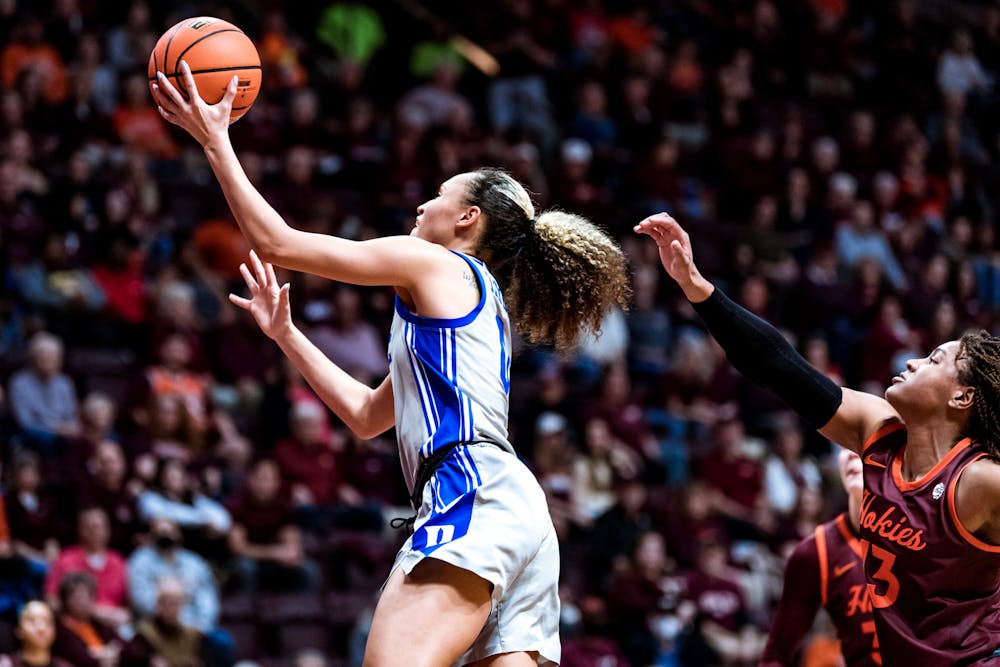No. 9 Duke ended the first quarter against No. 11 Virginia Tech Thursday evening down 23-11. The rest of the game was an uphill battle, and Duke never quite got the edge again, the ultimate 61-45 loss against the Hokies in Blacksburg, Va., marking its lowest-scoring game of the season.
But despite the early deficit, the first 10 minutes of play were not as lopsided as the score may suggest. The Blue Devils actually came out showing why they have come to be known as the best defensive team in the ACC.
Ultimately, while Virginia Tech wanted to push the pace early and play fast to capitalize on its growing lead, Duke often forced it to slow down. It often took more than 10 seconds for Virginia Tech to set up its offense thanks to Duke’s full-court press; the four shot clock violations Duke forced brings its season total to 32 forced violations. Virginia Tech was forced to call a timeout when up 11-6 because Duke’s full-court press left the Hokies no inbounding options, killing the Hokies’ momentum temporarily. Even after some sloppy offensive possessions from Duke where the Hokies would pick up a steal or a block, the Blue Devils were able to recover quickly enough to prevent Virginia Tech from scoring quickly in transition.
The perimeter defense was also solid early for Duke. After hitting 8-of-11 3-point attempts in its first quarter against Florida State, the Hokies did not attempt their first three for about six minutes of play. And there were some season-high individual defensive efforts for Duke: Graduate forward Taya Corosdale had a career-high five blocks, while graduate forward Mia Heide had a season-high three.
So, despite the early defensive rally, why was Virginia Tech able to enter the locker room at halftime up 33-14?
“I think they just were very aggressive getting to the paint,” head coach Kara Lawson said after the game. “[Senior center Elizabeth Kitley], obviously, we struggled to guard her one-on-one, as most teams do.”
The first answer here is obviously Kitley. Duke struggled to keep a tight watch on her early on as Lawson described, leaving her open on the baseline where she consistently sank midrange jumpers and snuck in for offensive rebounds and second-chance points. Some defensive miscues, like when 5-foot-8 junior guard Vanessa de Jesus ended up guarding 6-foot-6 Kitley during one possession, made it too easy for Kitley. Junior guard Georgia Amoore, alternatively, caused problems for Duke’s perimeter defense, which was initially air-tight, going 4-for-8 from behind the arc. She had four of Virginia’s five threes.
Last time Duke and the Hokies met up — when then-No. 16 Duke took a 66-55 win against then-No. 12 Virginia Tech in Cameron Indoor Stadium — Kitley and Amoore combined for 11 points. On Thursday night in Blacksburg, they combined for 13 points after eight minutes of play. They combined for 40 total, with 20 apiece, by the end.
Lawson also noted that the defense struggled to handle graduate forward Taylor Soule, who continued to attack holes and expose a lack of discipline for Duke that continued to spiral as the clock wore out.
“We did give up a couple baskets at the back end of the press. But that’s a lack of discipline in terms of matchups and where people are supposed to be,” Lawson said. “ … We just weren’t our normal selves defensively, and [Kitley and Soule] had a lot to do with it.”
The loss in Blacksburg was not solely caused by defensive woes. Duke could not convert much into offensive success throughout the game. Fifteen turnovers caused by the Hokies, including a string of stolen passes to start the second quarter, were indicative of an inefficient offense throughout the game for Duke. It was senior guard Celeste Taylor that carried the scoring in the first half for Duke, scoring eight of her team’s 11 first-half points, six of which came from the first quarter. She finished with 12 and was the only Blue Devil in double digits. Altogether, though, Duke shot 16-for-47 (34%) from the field, a bit below the Hokies’ 22-for-55 (40%) effort.
“[Taylor] really competed,” Lawson said. “She was the one player in that first half … that it meant something to. She attacked, she was competing defensively, she was communicating and she was trying to get everybody on the same page. And that’s what you’d expect from a senior, somebody that really has an incredible will to win, and we’ll need that from her.”
Duke will need to bring its defense back to its usual caliber to take its last three games against Virginia, N.C. State and No. 19 North Carolina, a difficult trio to face in closing out the regular season. It will head to Charlottesville at 2 p.m. Sunday to get started against the Cavaliers.
Get The Chronicle straight to your inbox
Sign up for our weekly newsletter. Cancel at any time.

Leah Boyd is a Pratt senior and a social chair of The Chronicle's 118th volume. She was previously editor-in-chief for Volume 117.

